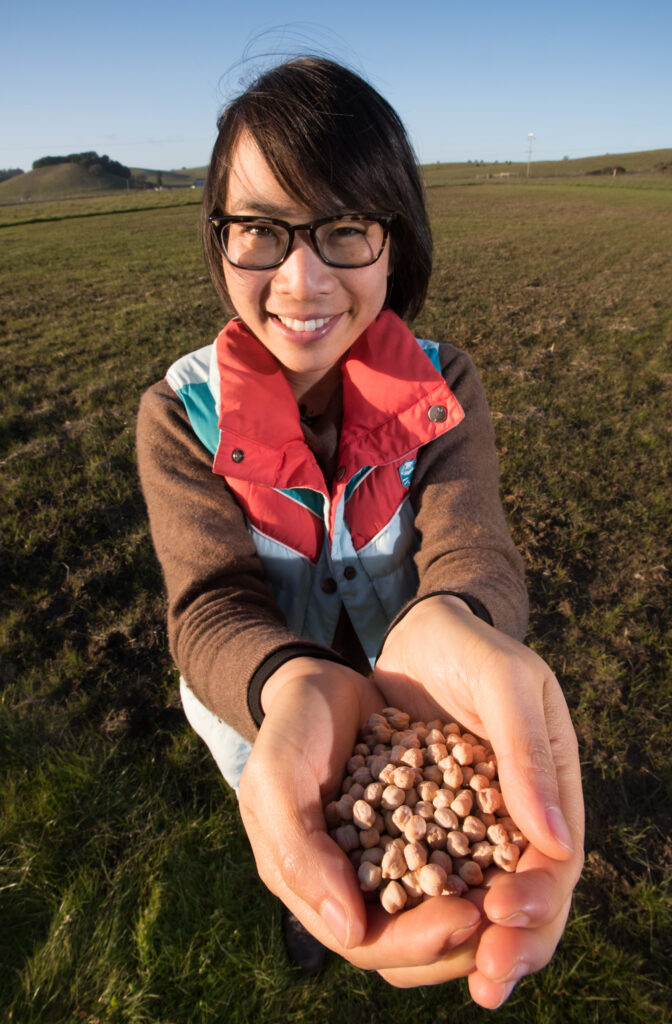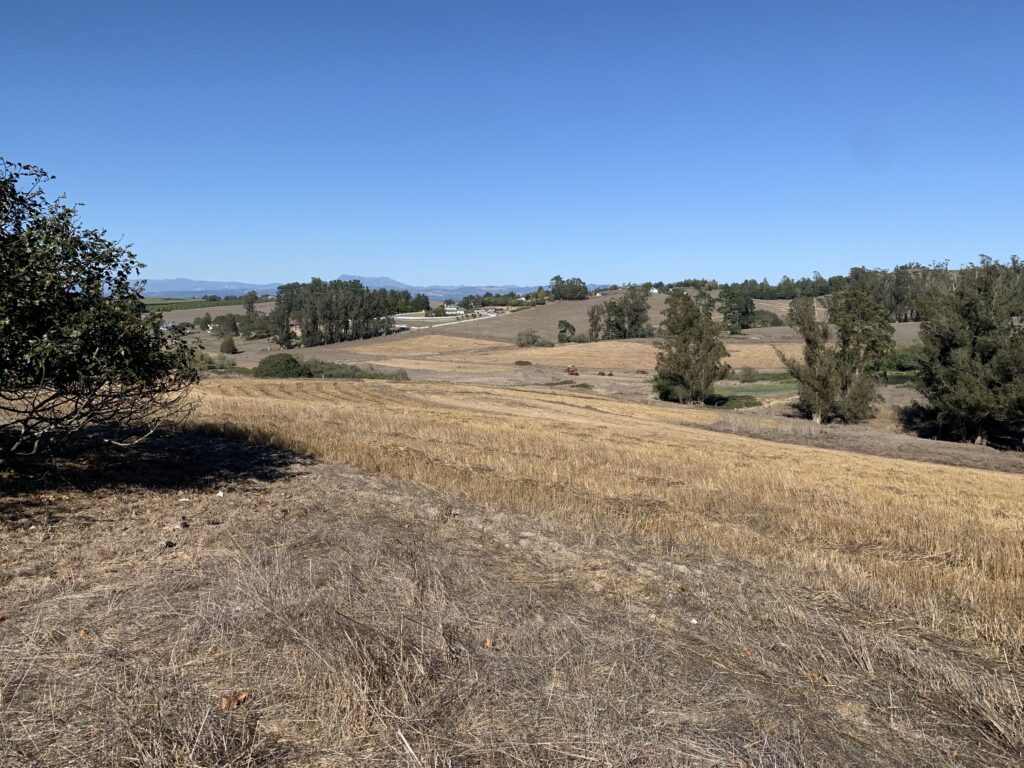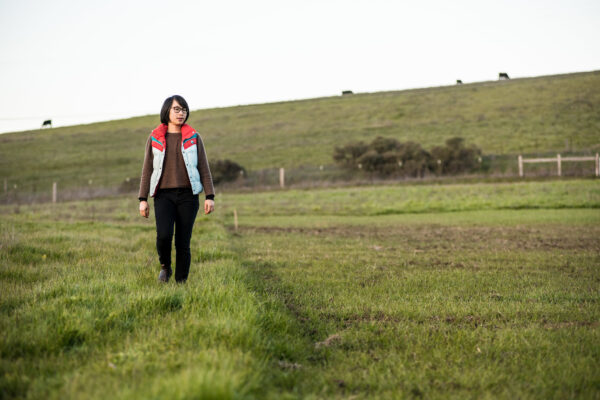This article was originally published on Religion News Service, with the support of CRCC’s global project on engaged spirituality.
The first time Mai Nguyen tried bread made with hard Red Fife wheat, it was unlike any bread they’d tasted. It was nutty and sweet, like marzipan. Later, Nguyen tried a slice of milk bread made with Chiddam Blanc de Mars, a soft spring wheat that Nguyen had planted and harvested on their own. The wheat smelled like pecans and honey, and like bright sage. It was umami and creamy, said Nguyen, like a bowl of porridge.
On a farm in Sonoma County, California, Nguyen grows heritage grains cultivated centuries ago in Kazakhstan, Mexico and South Africa, using organic, drought-tolerant and soil-enriching methods. Instead of spraying synthetic fertilizers and pesticides, Nguyen keeps the soil healthy with crop and animal rotations.

This holistic, diversified approach to farming requires less water than most conventional grains and relies on human and animal power as much as possible. The only water Nguyen uses is rainfall, even in California’s driest years.
Nguyen’s approach, based on Buddhist principles of interconnectedness, is designed to minimize negative impacts on the larger community of animals, people, plants and air.
“My Vietnamese and Buddhist upbringing taught me about interconnectedness and how we need to be concerned not only about our consumption, but about how we’re connected to everything in the world’s ecosystem,” Nguyen said. “I feel that as a farmer I have a responsibility to the other parts of our planet’s ecosystem.”
But not least among the benefits, Nguyen said, is the expansive flavors the farming techniques yield.
Nguyen’s parents fled Vietnam as young adults and landed in California as refugees in the late ’70s and early ’80s, after losing nearly everything to the war in Southeast Asia. Food functioned as a way to connect to ancestors and the past. Nguyen’s grandmother grew rau rum, chile peppers and bitter melon in the back yard, and Nguyen, who uses the pronouns they and them, remembers helping harvest these vegetables for weeknight family dinners.
Their grandmother also taught them about medicinal plants and boiling herbs down to healing concoctions. The two often made jars of fermented baby eggplant together to sell at temple on Sundays.
In this way, food and farming have always served as outlets for Nguyen’s Buddhist practice, which, growing up, they said, was “not just a spiritual practice, but one that is very socially connected and informed. It’s hard to say it was a religion … It was more just life.”
Studying ideas about matter in her college physics course, Nguyen couldn’t stop thinking about the waste that humans make and the Buddhist idea of reincarnation. “This waste isn’t going anywhere,” Nguyen recalled thinking, “so we must figure out how to give it a new life.”
Nguyen began leading a composting initiative for their cooperative housing unit. One day, after a shift of shoveling rotten food into a mound of compost, they wandered off into a campus garden plot. They plucked a berry from the field and noticed that it tasted completely different from the berries from the grocery store. “The berries had this vibrant and milky hue to them,” Nguyen said, “like they were already swimming in whipped cream.”
Standing in the campus garden, eating berries grown in composted soil, Nguyen recognized a profound dynamic of farming: giving waste a new life; connecting to family and Vietnamese culture; paying respect to ancestors through land stewardship; protecting nature; and building something that brings not only nourishment, but delight.
After college, Nguyen apprenticed on farms, including a stint raising grain and Vietnamese vegetables — gourds, chiles, squash, purple shiso — at a Buddhist monastery in Ukiah. There, Nguyen reveled in a feeling of closeness with their ancestors, a duty to living in a healthy environment, “out of a deep respect for a longer lineage of people who have done the work of land stewardship and seed saving,” they said.
Nguyen became fascinated with grain farming that improved the earth. They learned how to use the plants’ stalks as straw to create swales to reduce floods and how to increase organic matter in the soil. They also learned how to help rehabilitate land and reduce carbon emissions, while also making the land productive.
About a decade ago, Nguyen leased land to start their own grain farm. Many of their friends and family turned their noses up at the idea of a career in farming, but Nguyen’s conviction was deep.
Today, Nguyen produces over 20 varieties of grain, including drought-resistant wheat, barley, rye and millet, making them one of the very few California wheat farmers who has been able to produce substantial crops in the recent dry years. Nguyen has also developed commercial relationships with some of California’s most renowned bakers. The San Francisco Chronicle has called Nguyen’s grains “a coveted insider’s secret among top bakers and a favorite of breweries and distilleries.”

The biggest challenge to achieving sustainability is finding the right equipment. The machines needed to harvest, clean and mill the grain can cost upwards of $400,000. Much of this equipment is miles away and is sized for industrial operations — for years, the only grain cleaners Nguyen could find had grain minimums of 20,000 tons, about twice Nguyen’s annual production of any variety.
The best option was a melon seed cleaner on a family farm, where it took Nguyen three hours to drive to. Even then, the grain was often returned with vegetable seeds and small rocks.
Nguyen’s goal is to create an equipment cooperative with other small-production farmers, which she believes would encourage more small staple-food farming in California and model local, sustainable food production for other regions of the U.S.
Despite Nguyen’s success, farming can be heartbreaking. Even treating the land with intense care and love, crops sometimes fail. Climate change has increased rainfall’s unpredictability, which can throw off Nguyen’s entire harvest schedule. Without herbicides, organic crops ripen at different times, and weeds and other grains often aren’t eliminated before harvest. Because Nguyen does their own seed saving, they must help diverse varieties of seeds adapt to a California climate, which can take time and patience.
Then there are the problems that any farmer might have: fungus or mold infections; storms that damage equipment; backups at the mill. Nguyen wears a gold chain necklace with a jade pendant of female bodhisattva. In moments of loss, chaos and frustration, they reach for the necklace and think about the Buddhist Way. It’s like having a mentor, Nguyen said.
Nguyen knows that their small grain operation in California won’t solve climate change. But when Nguyen loses faith in their farm or feels overwhelmed by the vastness of climate change, or frustrated with corporate agriculture leaders who aren’t adapting to fight the global crisis, they turn to Buddhism.
“In Buddhism, there’s a strong focus on a kind of acceptance for what things are,” Nguyen said. “It’s the hardest thing you can do.”
Click here to read the full story on Religion News Service.
Photos: USDA Media by Lance Cheung (Public Domain)
Shaina Shealy is a journalist fellow with the Spiritual Exemplars Project.








